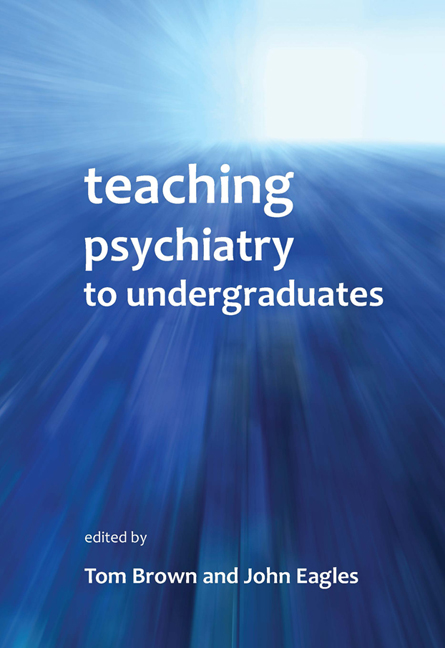Book contents
- Frontmatter
- Contents
- List of figures, tables and boxes
- List of contributors
- Preface
- Foreword
- 1 How do students learn?
- 2 Recent developments in undergraduate medical education
- 3 Undergraduate psychiatry teaching – the core curriculum
- 4 The organisation of undergraduate teaching
- 5 Assessment of undergraduates in psychiatry
- 6 Using computers to teach undergraduate psychiatry
- 7 How to give a lecture
- 8 How to do small-group teaching
- 9 Problem-based learning
- 10 Teaching trainee psychiatrists how to teach medical students: the Southampton model
- 11 Involving trainees in teaching
- 12 Involvement of service users in psychiatric education
- 13 Time-efficient clinical teaching
- 14 Intercalated degrees
- 15 Undergraduate experiences of psychiatry: a student view
- 16 Integration: teaching psychiatry with other specialties
- 17 Teaching the teachers in a cross-cultural setting: the Scotland–Malawi Mental Health Education Project
- 18 International undergraduate teaching
- 19 Teaching with simulated patients and role-play
- 20 Undergraduate medical education and recruitment to psychiatry
- 21 Choosing psychiatry: factors influencing career choice among foundation doctors in Scotland
- 22 Funding of the teaching of medical undergraduates
- 23 Dealing with students in difficulty
- 24 Training medical students to promote good mental health in secondary schools
- 25 Women in medicine
- Index
16 - Integration: teaching psychiatry with other specialties
- Frontmatter
- Contents
- List of figures, tables and boxes
- List of contributors
- Preface
- Foreword
- 1 How do students learn?
- 2 Recent developments in undergraduate medical education
- 3 Undergraduate psychiatry teaching – the core curriculum
- 4 The organisation of undergraduate teaching
- 5 Assessment of undergraduates in psychiatry
- 6 Using computers to teach undergraduate psychiatry
- 7 How to give a lecture
- 8 How to do small-group teaching
- 9 Problem-based learning
- 10 Teaching trainee psychiatrists how to teach medical students: the Southampton model
- 11 Involving trainees in teaching
- 12 Involvement of service users in psychiatric education
- 13 Time-efficient clinical teaching
- 14 Intercalated degrees
- 15 Undergraduate experiences of psychiatry: a student view
- 16 Integration: teaching psychiatry with other specialties
- 17 Teaching the teachers in a cross-cultural setting: the Scotland–Malawi Mental Health Education Project
- 18 International undergraduate teaching
- 19 Teaching with simulated patients and role-play
- 20 Undergraduate medical education and recruitment to psychiatry
- 21 Choosing psychiatry: factors influencing career choice among foundation doctors in Scotland
- 22 Funding of the teaching of medical undergraduates
- 23 Dealing with students in difficulty
- 24 Training medical students to promote good mental health in secondary schools
- 25 Women in medicine
- Index
Summary
Introduction
Psychiatry has not always enjoyed a distinct place in the undergraduate medical curriculum (Davies & McGuire, 2000) and its status remains variable in the current curricula of many of the UK and Ireland's medical schools (Karim et al, 2009). Since most UK medical schools emerged from the in-house training courses for physicians and surgeons existing in the major hospitals (the ‘teaching’ hospitals), perhaps it is not surprising that their curricula replicated the range of specialties available at those hospitals. Specialties that were geographically separated from the great hospitals or were newly developing (e.g. primary care and psychiatry) were less likely to be represented in undergraduate teaching. It was not until the latter part of the 20th century that consideration was given to balancing the medical curriculum with a view to producing omnipotential graduates with the capability of entering a wide range of postgraduate specialties.
As the body of biomedical knowledge increased in both quantity and complexity, so competition increased for time and resources in the curriculum. In the UK, the General Medical Council (1993, 2003, 2009a) responded to these pressures on students’ time with Tomorrow's Doctors, which shifted the balance from ‘just in case’ learning of facts, regardless of their potential relevance for a newly qualified doctor, to ‘just in time’ learning, with an emphasis on providing the knowledge and skills necessary for the early years of a clinical career; these ideas, originally from manufacturing, are now firmly established in education. Key to this shift is an increased focus on the patient rather than the specialty, and on developing clinical skills and demonstrating competence in common practical procedures rather than amassing medical knowledge.
As a recent survey of medical schools by the Association of University Teachers of Psychiatry (Karim et al, 2009) showed, just over half of medical schools adhere to the traditional medical undergraduate model of teaching psychiatry as a circumscribed block during the latter part of the medical course (the ‘clinical’ years). Clearly, many psychiatric teachers have been happy to have obtained a block of curriculum time that is their own, to be used as they think fit. Change to a more integrated role for psychiatry in the undergraduate curriculum requires a good deal of effort on the part of curriculum planners and teachers alike.
- Type
- Chapter
- Information
- Teaching Psychiatry to Undergraduates , pp. 186 - 204Publisher: Royal College of PsychiatristsPrint publication year: 2011

